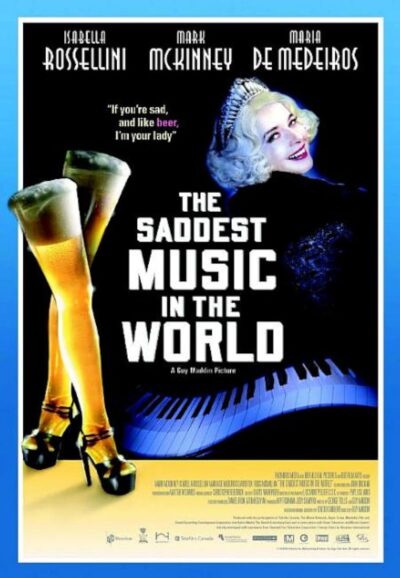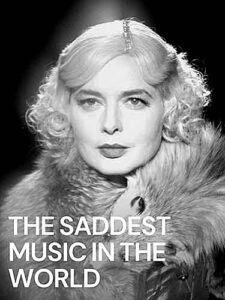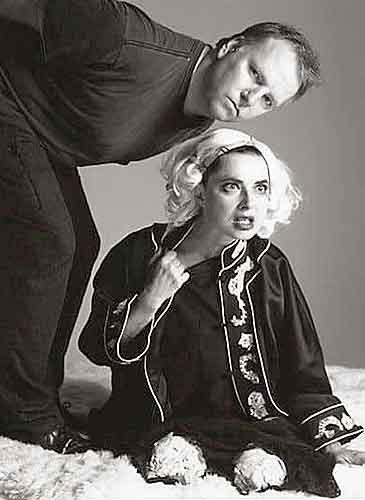A film that in most particulars would appear to qualify for Profoundly Weird status, but which in the filmography of its director, Canada’s Guy Maddin, doesn’t seem too strange at all. Upon its 2003 completion, in fact, THE SADDEST MUSIC IN THE WORLD was widely viewed as Maddin’s most mainstream effort. It was certainly his most ambitious and monumental, and the first of Maddin’s cockeyed love letters to his native Winnipeg (with the second, 2007’s MY WINNIPEG, being an even stronger, and stranger, film).
The film’s basis was an original screenplay by the renowned novelist Kazuo Ishiguro (of THE REMAINS OF THE DAY and THE WHITE COUNTESS). That script was reportedly set in Britain, but Maddin and frequent screenwriting partner George Toles heavily retooled it, starting with the setting.
Done up in Maddin’s signature mock-old movie style, i.e. in ultra-grainy black-and-white photography (with color tints), it’s set in Winnipeg during “The Depths of the Great Depression.” Winnipeg is the uncontested title holder of World Capital of Sorrow, and so is uniquely suited to hold a contest, sponsored by a prominent Canadian beer company, to see which country can create the saddest music in the world. Lady Helen Port-Huntley (Isabella Rossellini), a seductive double amputee, is the judge, offering a thumbs up or thumbs down to the winner of a succession of two person competitions, after which the winners are slid into a tub of beer. The ultimate prize: the princely sum of $25,000.
Into the fray comes Chester Kent (Mark Mckinney), a former lover of Helen, and his current flame Narcissa (Maria de Medeiros). Chester, a Canadian who’s resettled in the US, represents America in the contest, while his estranged brother Roderick (Ross McMillan), who keeps the heart of his dead son in a jar, and “super Canadian” father Fyodor (David Fox), who was responsible for Helen’s double amputation, represent Canada. Other entrants do the honors for Siam, in a flute solo through which “you can almost hear the typhoon bearing down on a defenseless seaside village,” and Mexico, with singers providing a “sad peek into child burial customs down Mexico way.”
Chester proves himself a wily sort, bribing other contestants to drop out in order to improve his chances, and procures a pair of Fyodor constructed glass legs that are filled with beer. An ecstatic Helen eagerly grafts the glass limbs on to her stumps and enters into a torrid affair with Chester—which, needless to add, greatly compromises her judging duties.
The budget here may have been more substantial than those of Maddin’s earlier films, but the script is very much in keeping with previous Maddin features like TALES FROM THE GIMLI HOSPITAL (1988), ARCHANGEL (1990) and CAREFUL (1992). So too the grain-heavy film stock, soft focus close-ups and lighting inconsistencies, which in Maddin’s hands actually work magic, imparting the feel of a filmic relic from some past age (only the up-to-date sound mixing betrays the film’s post-2000 origins). Adding to the archaic feel are the deliberately artificial settings (it was filmed, according to Maddin, in the “coldest sound stage in movie history”) and ultra-histrionic performance.
Isabella Rossellini and co-star Maria De Medeiros (from HENRY AND JUNE and PULP FICTION) have never been utilized better in a film, and THE KIDS IN THE HALL’s Mark McKinney and Maddin regular Ross McMillan also fare well, clearly understanding the odd tone and style Maddin employs. The film was clearly played for laughs a la John Waters, but there’s a much stranger, more elusive dimension to the film that, as with all of Maddin’s best works, places it in a category of its own. Ultimately I’m not quite sure what THE SADDEST MUSIC IN THE WORLD is, but it seems well worth pondering.
Vital Statistics
THE SADDEST MUSIC IN THE WORLD
Rhombus Media/Buffalo Gal Pictures/Ego Film Arts
Director: Guy Maddin
Producers: Niv Fichman, Jody Shapiro
Screenplay: Guy Maddin, George Toles
(Based on a screenplay by Kazuo Ishiguro)
Cinematography: Luc Montpellier
Editing: David Wharnsby
Cast: Mark McKinney, Isabelle Rossellini, Maria de Medeiros, Ross McMillan, David Fox, Louis Negin, Darcy Fehr, Claude Dorge, Talia Pura, Jeff Sutton, Graeme Valentin, Maggie Nagie, Victor Cowie, Jessica Burleson, Wayne Nicklas, Nancy Drake, David Gillies, Daphne Korol, Adriana O’Neil, Jeff Skinner



